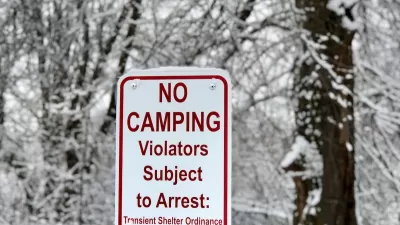Despite the common belief that drug abuse and mental illness are some of the main factors that cause people to become unhoused, a new book concludes that high housing costs and low availability, more than anything else, push people into homelessness.

As Gary Warth reports in the Los Angeles Times, a new book by Clayton Page Aldern and Gregg Colburn analyzes the contributing causes of homelessness, with results contrary to popular notions about why people fall into homelessness. “By looking at the rate of homeless per 1,000 people, they found communities with the highest housing costs had some of the highest rates of homelessness, something that might be overlooked when looking at just the overall raw number of homeless people.” What the places with the highest rates of homelessness had in common, Warth writes, “was a lack of affordable housing.”
“Aldern, a data scientist and policy analyst in Seattle, and Colburn, an assistant professor of real estate at the University of Washington’s College of Built Environments, said they are not suggesting that mental illness, addictions and other issues are not contributing factors to homelessness.” However, Aldern continues, “I firmly believe that we can’t treat our way out of this problem. You could fix all the addiction in San Diego right now and you’d still have a problem with homelessness because there just aren’t places for people to go who have lower levels of income.” By contrast, “The researchers looked at homelessness in West Virginia and Arkansas, which were hit hard by the opioid epidemic, and found the homeless rate was low. Housing prices in those states also are lower than in many cities with higher homeless rates, Colburn said.”
Lisa Jones, executive vice president of strategic initiatives at the San Diego Housing Commission, agrees, adding, “We also know that the longer a household experiences homelessness, the more likely other key quality-of-life factors will be affected, such as physical and mental well-being.” According to Colburn, “it is true that people who are poor, addicted or mentally ill are more likely to experience homelessness, but a disproportionate number of people with those conditions is not the cause of higher rates of homelessness in some areas.”
The study also debunked a number of other common myths about homelessness, such as that states with greater public assistance have higher rates of homelessness (they don’t), or that homelessness is higher in cities with Democrat mayors (“In reality, most major cities have Democrats as mayor, but that also includes cities such as Detroit with smaller homeless populations”).
FULL STORY: Cause of homelessness? It’s not drugs or mental illness, researchers say

Trump Administration Could Effectively End Housing Voucher Program
Federal officials are eyeing major cuts to the Section 8 program that helps millions of low-income households pay rent.

Planetizen Federal Action Tracker
A weekly monitor of how Trump’s orders and actions are impacting planners and planning in America.

Ken Jennings Launches Transit Web Series
The Jeopardy champ wants you to ride public transit.

California Invests Additional $5M in Electric School Buses
The state wants to electrify all of its school bus fleets by 2035.

Austin Launches $2M Homelessness Prevention Fund
A new grant program from the city’s Homeless Strategy Office will fund rental assistance and supportive services.

Alabama School Forestry Initiative Brings Trees to Schoolyards
Trees can improve physical and mental health for students and commnity members.
Urban Design for Planners 1: Software Tools
This six-course series explores essential urban design concepts using open source software and equips planners with the tools they need to participate fully in the urban design process.
Planning for Universal Design
Learn the tools for implementing Universal Design in planning regulations.
Ada County Highway District
Clanton & Associates, Inc.
Jessamine County Fiscal Court
Institute for Housing and Urban Development Studies (IHS)
City of Grandview
Harvard GSD Executive Education
Toledo-Lucas County Plan Commissions
Salt Lake City
NYU Wagner Graduate School of Public Service





























